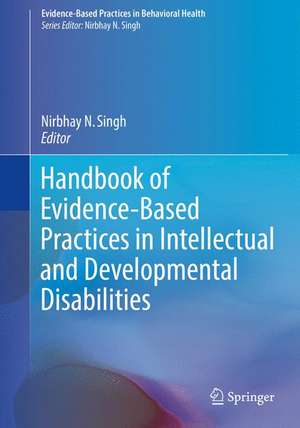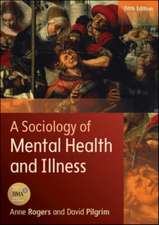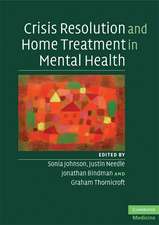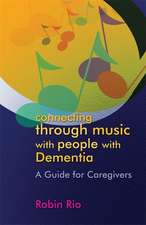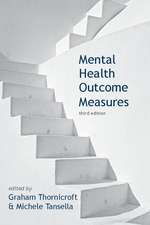Handbook of Evidence-Based Practices in Intellectual and Developmental Disabilities: Evidence-Based Practices in Behavioral Health
Editat de Nirbhay N. Singhen Limba Engleză Paperback – 22 iun 2018
This handbook presents a diverse range of effective treatment approaches for individuals with intellectual and developmental disabilities (IDD). Its triple focus on key concepts, treatment and training modalities, and evidence-based interventions for challenging behaviors of individuals with IDD provides a solid foundation for effective treatment strategies, theory-to-implementation issues, and the philosophical and moral aspects of care. Expert contributions advocate for changes in treating individuals with intellectual and developmental disabilities by emphasizing caregiver support as well as respecting and encouraging client autonomy, self-determination, and choice. With its quality-of-life approach, the handbook details practices that are person-centered and supportive as well as therapeutically sound.
Topics featured in the handbook include:
- Functional and preference assessments for clinical decision making.
- Treatment modalities from cognitive behavioral therapy and pharmacotherapy to mindfulness, telehealth, and assistive technologies.
- Self-determination and choice as well as community living skills.
- Quality-of-life issues for individuals with IDD.
- Early intensive behavior interventions for autism spectrum disorder.
- Skills training for parents of children with IDD as well as staff training in positive behavior support.
- Evidence-based interventions for a wide range of challenging behaviors and issues.
The Handbook of Evidence-Based Practices in Intellectual and Developmental Disabilities is a must-have resource for researchers, clinicians, scientist-practitioners, and graduate students in clinical psychology, social work, behavior therapy, and rehabilitation.
| Toate formatele și edițiile | Preț | Express |
|---|---|---|
| Paperback (1) | 2283.25 lei 43-57 zile | |
| Springer International Publishing – 22 iun 2018 | 2283.25 lei 43-57 zile | |
| Hardback (1) | 3239.09 lei 43-57 zile | |
| Springer International Publishing – 23 mai 2016 | 3239.09 lei 43-57 zile |
Preț: 2283.25 lei
Preț vechi: 2403.42 lei
-5% Nou
Puncte Express: 3425
Preț estimativ în valută:
437.01€ • 450.36$ • 368.94£
437.01€ • 450.36$ • 368.94£
Carte tipărită la comandă
Livrare economică 03-17 martie
Preluare comenzi: 021 569.72.76
Specificații
ISBN-13: 9783319928487
ISBN-10: 3319928481
Pagini: 984
Ilustrații: XLI, 984 p. 36 illus., 4 illus. in color.
Dimensiuni: 178 x 254 mm
Greutate: 1.74 kg
Ediția:1st ed. 2016
Editura: Springer International Publishing
Colecția Springer
Seria Evidence-Based Practices in Behavioral Health
Locul publicării:Cham, Switzerland
ISBN-10: 3319928481
Pagini: 984
Ilustrații: XLI, 984 p. 36 illus., 4 illus. in color.
Dimensiuni: 178 x 254 mm
Greutate: 1.74 kg
Ediția:1st ed. 2016
Editura: Springer International Publishing
Colecția Springer
Seria Evidence-Based Practices in Behavioral Health
Locul publicării:Cham, Switzerland
Cuprins
Chapter 1. Implementing Evidence-Based Practices Wisely.- PART 1: Foundations.- Chapter 2. Definition and Nature of Intellectual Disability.- Chapter 3. Evidence-Based Practices.- Chapter 4. Functional Assessment.- Chapter 5. Preference Assessments for Clinical Decision Making.- Chapter 6. Prevention of Severe Problem Behavior.- Chapter 7. Community Support Needs.- Chapter 8. Quality of Life.- Chapter 9. Functional Skills.- PART 2: Treatment and Training Modalities.- Chapter 10. Complementary and Alternative Therapies.- Chapter 11. Cognitive Behavioral Therapy.- Chapter 12. Mindfulness.- Chapter 13. Psychopharmacology.- Chapter 14. Assistive Technology.- Chapter 15. Positive Behavior Support.- Chapter 16. Staff Training in Positive Behavior Support.- Chapter 17. Parent Training.- Chapter 18. Social Skills.- Chapter 19. Early Intensive Behavioral Interventions.- Chapter 20. Active Support.- Chapter 21. Self-Determination and Choice.- Chapter 22. Telehealth.- Chapter 23. Skills Trainingfor Parents with Intellectual Disabilities.- PART 3: Evidence-Based Interventions.- Chapter 24. Self-Injury.- Chapter 25. Rumination.- Chapter 26. Pica.- Chapter 27. Aggressive Behavior.- Chapter 28. Stereotypy.- Chapter 29. Inappropriate Sexual Behavior and Sexual Offending.- Chapter 30. Sleep Disorders.- Chapter 31. Communication.- Chapter 32. Vocational Training.- Chapter 33. Leisure Skills.- Chapter 34. Community Living and Participation.- Chapter 35. Health and Wellness.- Chapter 36. Safety Skills.- Chapter 37. Toilet Training.- Chapter 38. Substance Use Disorders.
Recenzii
“This book covers a spectrum of topics relevant to the understanding of the philosophy, policy, assessment, and intervention related to evidence-based practice in the intellectual and developmental disability field. … This book will be invaluable for graduate students, professionals working in community services, special education teachers, clinicians in residential facilities, psychiatrists and all other clinicians involved in the care of individuals with intellectual and developmental disabilities.” (Ramasamy Manikam, Journal of Child and Family Studies, Vol. 26, 2017)
“This book presents the current evidence-base for assessment, treatment modalities, and interventions for individuals with intellectual and developmental disabilities. … For academics, this book provides a wealth of information on virtually all issues associated with intellectual and developmental disabilities, and identifies areas in need of further research to grow this field. Thus, if there is space for only one book on this topic in your office, this is the book.” (Theresa M. Courtney, Advances in Neurodevelopmental Disorders, Vol. 1, 2017)
Notă biografică
Nirbhay N. Singh, Ph.D., is Clinical Professor of Psychiatry at the Medical College of Georgia, Georgia Regents University, Augusta GA. He is also with ONE Research Institute in Raleigh NC. He was formerly a Professor of Psychiatry, Pediatrics, and Clinical Psychology at the Virginia Commonwealth University School of Medicine and Director of the Commonwealth Institute for Child and Family Studies, Richmond VA. His research interests include behavioral and psychopharmacological treatments of individuals with disabilities, assistive technology for supporting individuals with severe, profound, and multiple disabilities, and mindfulness. He is the Editor-in-Chief of two international journals, Journal of Child and Family Studies and Mindfulness, and Editor of the book series, Mindfulness in Behavioral Health.
Textul de pe ultima copertă
This handbook presents a diverse range of effective treatment approaches for individuals with intellectual and developmental disabilities (IDD). Its triple focus on key concepts, treatment and training modalities, and evidence-based interventions for challenging behaviors of individuals with IDD provides a solid foundation for effective treatment strategies, theory-to-implementation issues, and the philosophical and moral aspects of care. Expert contributions advocate for changes in treating individuals with intellectual and developmental disabilities by emphasizing caregiver support as well as respecting and encouraging client autonomy, self-determination, and choice. With its quality-of-life approach, the handbook details practices that are person-centered and supportive as well as therapeutically sound.
Topics featured in the handbook include:
- Functional and preference assessments for clinical decision making.
- Treatment modalities from cognitive behavioral therapy and pharmacotherapy to mindfulness, telehealth, and assistive technologies.
- Self-determination and choice as well as community living skills.
- Quality-of-life issues for individuals with IDD.
- Early intensive behavior interventions for autism spectrum disorder.
- Skills training for parents of children with IDD as well as staff training in positive behavior support.
- Evidence-based interventions for a wide range of challenging behaviors and issues.
The Handbook of Evidence-Based Practices in Intellectual and Developmental Disabilities is a must-have resource for researchers, clinicians, scientist-practitioners, and graduate students in clinical psychology, social work, behavior therapy, and rehabilitation.
Caracteristici
Distills current research across related disciplines on assessment, treatment and training modalities, and evidence-based outcomes for major clinical areas in intellectual disability Examines diagnostic instruments and functional assessment techniques Explores how to integrate risk assessment and interventions Reviews emerging technologies, such as complementary and alternative therapies as well as assistive technology? Includes supplementary material: sn.pub/extras
